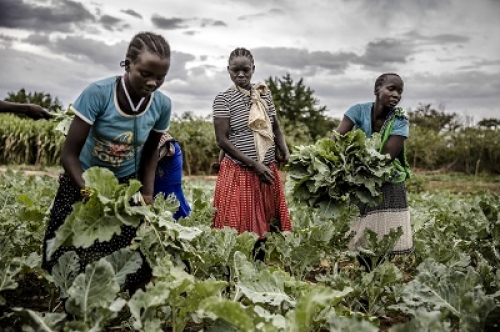CFS side event calls for more and better data to measure companies’ performance on the SDGs

In the margins of the 48th session of the Committee on World Food Security (CFS), FAO, together with Apeel, Columbia Center on Sustainable Investment and Unilever co-hosted “By the numbers – capturing the private sector contribution to the Sustainable Development Goals (SDGs) and the agri-food system transformation” on Thursday 3 June.
Attended by more than 120 participants, this event brought together the perspectives of diverse stakeholders to discuss how measurable progress is key in ensuring business impact towards agri-food systems transformation for people and the planet.
Speakers agreed that considerably more still needs to be done to address gaps in existing alignment, reporting and data on private sector contribution to the SDGs and identified opportunities to further address these gaps.
“Good corporate data is essential for national governments to engage in an open dialogue and policy discussions on sustainability issues”, said Pietro Gennari, FAO Chief Statistician.
Speaking for Columbia Center on Sustainable Investment, Nora Mardirossian emphasized the lack of clarity on what SDG-aligned and sustainable business conduct looks like. “Without this, company reporting will remain patchwork, missing important issues, business activities and relationships, which are relevant to the SDGs”, they said.
From her side, Vanessa Maire from Unilever, stressed the need to develop a culture of stronger reporting behaviour across business value chains. “Information is a key component of baselining, goal setting and making progress towards the SDGs”, she said. Wider standardization is also key to improve reporting as “Companies are reporting against multiple standards and frameworks that have integrated to some extent the SDGs but there isn’t one framework that can be followed internationally as a gold standard and this causes data fragmentation across multiple data repositories such as the Carbon Disclosure Project (CDP), the Dow Jones, the Global Reporting Initiative (GRI) and others”, she added.
“There is no standardized framework against which companies should report or share data directly that would support monitoring of progress on the SDGs, nor is it incorporated explicitly into existing reporting mechanisms like the Global Reporting Initiative (GRI), the Climate Disclosure Standards Board (CDSP) and the Sustainability Accounting Standards Board (SASB)”, also underscored Jessica Vieira, from Apeel. “At the same time, companies have access to specific granular data about the value chains which they operate which could be useful in monitoring specific aspects of the SDGs”, she added.
“The SDG agenda hasn’t been fully delineated into private-sector specific commitments, expected actions and a unique monitoring framework to which the private sector could align”, said Valérie Bizier, FAO. “Fortunately, there are several initiatives currently aiming to tackle this issue. The approaching United Nations Food Systems Summit will also help in identifying and getting consensus on what we should expect from the private sector in terms of commitments. However, in terms of reporting and capturing the contribution to these commitments and therefore the SDGs, we need to be more ambitious in terms of who report, what they report and how they report it. It is in a perspective to propose harmonized and minimum disclosures […] that FAO has developed a core set of food and agriculture indicators to measure the private sector contribution to the SDGs.”
In their interventions, the panellists focused on the paramount role of governments, private sector, tech companies, farmers, investors and finance, researchers and standard-setters, but also FAO, in contributing to better data collection, harmonisation and use of private sector’s sustainability data.
On private sector accountability, Vanessa Maire highlighted the need for a strong science-based accountability framework, stronger alignment between private sector and governments’ national strategies as well as the role of data platforms as potential game-changing solutions to address some of the SDG challenges.
“There needs to be scope for private sector to contribute on specific areas without a requirement to report against the wide range, and thought given to how to ensure the data that is shared is managed in a way which protects confidentiality and incentivises the private sector by providing access to aggregated information and insights.”, emphasized Jessica Vieira.
The participants looked forward to the upcoming United Nations Food Systems Summit in New York in September and the Pre-Summit in Rome in July, which “offer a great opportunity to improve private sector’s commitments and accountability for the sustainable transformation of agri-food systems to accelerate the achievement of the SDGs”, emphasized Valerie Bizier.
Closing the meeting, Nora Mardirossian welcomed the contributions of FAO’s core food and indicators and World Benchmarking Alliance. “We plan, with FAO and others, to make sure SDG-aligned business practices and reporting are central at Food Systems Summit. We are engaging with other standard-setters and reporting initiatives to discuss how we can better coordinate to drive change in aligning food sector practices with the SDGs”, they said.
Watch the recording of the event
- Core food and agricultural indicators for measuring the private sector’s contribution to the achievement of the Sustainable Development Goals (FAO, 2021): http://www.fao.org/fsnforum/activities/discussions/SDGs_core_indicators
- Synthesis Reports on the game-changing solutions: https://www.un.org/en/food-systems-summit/documentation
- “Practical Guide on Integrating the SDGs into Corporate Reporting” (Global Reporting Initiative (United Nations Global Compact, 2018): https://www.unglobalcompact.org/library/5628
- Guidance on Core Indicators for Entity Reporting on Contribution Towards Implementation of the Sustainable Development Goals (United Nations Conference on Trade and Development, 2019): https://unctad.org/system/files/official-document/diae2019d1_en.pdf
- Methodology for the Food and Agriculture Benchmark (World Benchmarking Alliance, 2021): https://assets.worldbenchmarkingalliance.org/app/uploads/2021/02/Food-and-Agriculture-Benchmark-methodology-report.pdf
